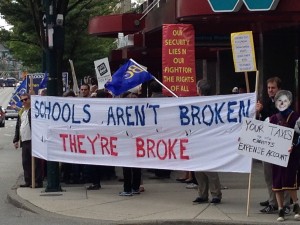Mayor of iPopU
Edutainum Infinitum

Let’s face it: Evaluation is silly. Reviews of programs and units in universities in this day and age are even sillier. Units put the Unit in Unitversity, so what’s to review? No one really believes the Commission on Institutions of Higher Education when they boast in the naval-gazing Self-Study Guide that “undertaking a self-study is a major enterprise” or “self-study cannot be done well under rushed conditions.” Says who? These academic proverbs sell booklets with a wink wink and a chuckle.
That is the gist of the administrative genius of a major innovation in evaluation at iPopU. We drilled down to what is the core of the Review process and then inventoried trends to find that the Rating widget solves every problem of evaluation.
There are three types of evaluations, Conformative, Normative, and Summative, or what I’m told is better known in the field nowadays as Corporative, and the Rating widget solves all three at once. Yes, I hear you nodding, quite the little workhorse that Rating widget!
Yet, it took iPopU to repurpose it to the depth work of admin.
When we announced that it was time for Reviews, the yawning started and then came the dragging of the heels, for years. Check, we hear you when you say evaluations never change anything. Check, we hear you when you say you have better things to do. Check, we hear you when you say self-studies can be completed by a grad student or staff member with a Fillitin app on their phones. Check, we hear you when you say accreditation is a carry-over make-work relic of the medieval scholiastics. Check, we see you when you ask there must be a better way.
In one School, we have fourteen senior administrators who are already bumping into each other. Assigning a few to oversee a Review just adds to this. Remember, a bustling administrative office is like hot air when heated with a fan, electrons expand and collide with each other. In the old days, we dragged out Reviews for years, from one to the next, thinking that the best review was the prolonged review. We had two Associate Deans of the Office of Review. When we reviewed our 65 programs some time ago, comic relief faculty lovingly referred to this as a three-ring circus and then posted it on iPopUtube as a keystone cops episode. So we made admin offices bigger to avoid that. But, I listen to you wondering, are these admins underworked? I answer to that, better to have many than few. Am I right?
So iPopU introvated and in 2013 did all Reviews with the Rating widget.
Read More: iPopU: Innovation in Evaluation

 Follow
Follow

